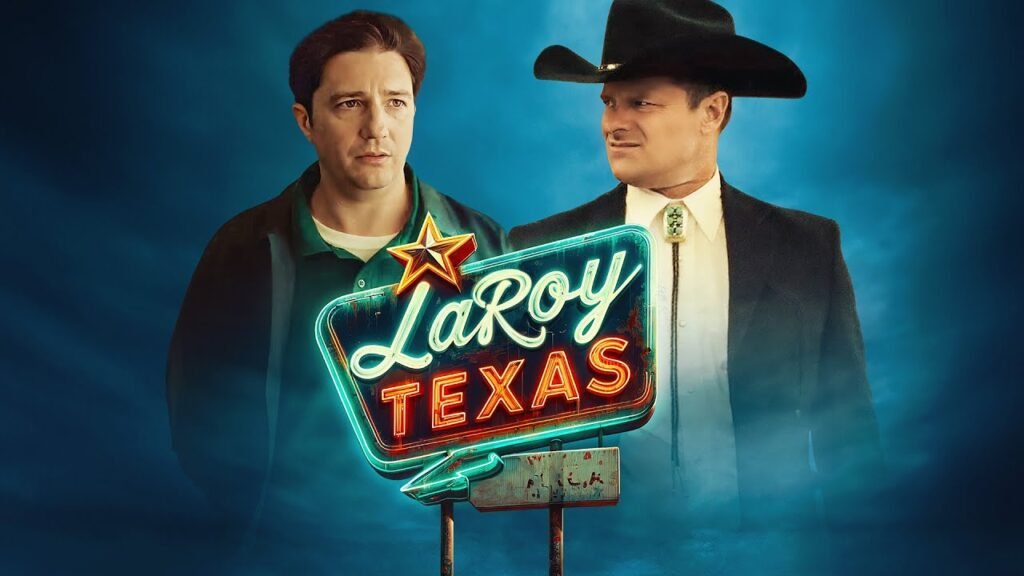
LaRoy, Texas
The phrase “LaRoy, Texas” is an immediate test of expectations. Driving down a dark dirt country road, Harry (Dylan Baker) whose car headlights are the only beacons of life in the barren clime passes a broken down truck parked off road. A few yards later, Harry sees the possible driver of the abandoned vehicle. Picking up the stranded soul, he realizes it’s a bearded, foreboding hitchhiker who looks like the beginning of a true-crime mystery. Baker is a curious choice for this role, as an actor, he’s equally known for playing hapless idiots and soulless pencil pushers. Yet here he is cheerfully engaging in conversation with the mysterious hitchhiker who half-heartedly jokes about the dangers of picking up strangers. Harry seems like an innocent small town fellow deflecting this stranger’s hypotheticals with unassuming ease until their roles turn: Well maybe, Harry asks if he purposefully damaged the hitchhiker’s vehicle at some previous rest stop so that he could pick him up?
Author and director Shane Atkinson has a smart way of starting his movie. The main character is Harry, who happens to be an assassin. Once he is through with his first victim (he has many more on the list), he receives a call for another assignment in LaRoy, Texas a small bush town. This is where all hell breaks loose. Atkinson’s feature debut is a hilarious western-thriller that tips its hat to the Coen brothers while breathing life into its hapless protagonist.
But it’s not about Harry; the protagonist is Ray (John Magaro in a powerfully understated performance), a LaRoy native. Early in the film, Ray meets Skip (a charming Steve Zahn), who has just started working as a private investigator. Skip is an inept but well-meaning fool, he wears black cowboy hats and blazers because of “Walker, Texas Ranger.” However, he does have some important information: black-and-white photographs of Ray’s wife Stacy-Lynn (Megan Stevenson), former beauty queen, entering a seedy motel room. The revelation sends shell-shocked Ray on a mission to satisfy demanding Stacy Lynn and her dream of owning a salon he just needs to find some cash.
Ray is too trusting for his own good. For one thing, he can’t bring himself to believe that Stacy Lynn would ever cheat on him. Worse yet, when he goes to his asshole brother Junior (Matthew Del Negro) who co-owns the family hardware store with him for money after work hours, he takes Junior at his word that they’re broke even though Junior recently bought a yacht for his mansion-sized house. Ray is so pathetic he buys a gun with plans to shoot himself in the parking lot of a strip joint; however, by chance another man jumps into his car with an envelope full of cash for what turns out to be one of Harry’s hits, and wanting desperately to be somebody, Ray goes along with it. He kills his mark, then gets roped into a larger conspiracy involving a used car salesman and has to get back a suitcase full of money before Harry finds him while also trying to save his flatlining marriage.
“LaRoy, Texas” is an unnecessarily convoluted mess, the confusing intricacies of which aren’t helped by the fact that Ray is unrealistically dumb. Somewhere between not connecting the incredibly obvious dots of his wife’s infidelity and thinking that opening a salon will fix everything, the character jumps from merely irritatingly stupid over the shark to infuriatingly insipid, so much so that you want to kill him too. Thankfully, Magaro is so good so comfortable in his own skin as a vulnerable loser that you forgive the script’s shortcomings, likewise with Magaro’s chemistry with Zahn. This is a movie propelled by their unguarded male friendship, one shared by two unserious failures who need someone to recognize their abilities and desires and personhood. In each other they find worthy reflections.
The film also benefits from its goofy violence (a la “Fargo”) and its interest in men who are crushed under the weight of brooding evil just around life’s corner (a la “No Country for Old Men”). Vast dusky landscapes and ramshackle hole in the walls serve as backdrops for Ray’s misadventures; sickly fluorescent hues color oddball people in off kilter spaces. They’re exterior textures that speak to Ray’s inner marital turmoil: How do we stay committed to our marital promises? What are the bounds of spousal loyalty?
It takes far too long for “LaRoy” to get around asking those questions in earnest.
However, the ultimate elegiac scene between Harry and Ray where Ray decides to pay tribute to his friendship with Skip as well as stand up for himself at last, ends aching bitter-sweet. Atkinson pairs the mournful scene with Colter Wall’s slow cover of the country ballad “Cowpoke.” It is this confident intermingling of feelings that makes “LaRoy, Texas” a solid tonal trip a movie in love with people living on the outskirts of respectability that bodes good for whatever wild story Atkinson wants tell next.
For More Movies Visit Putlocker.